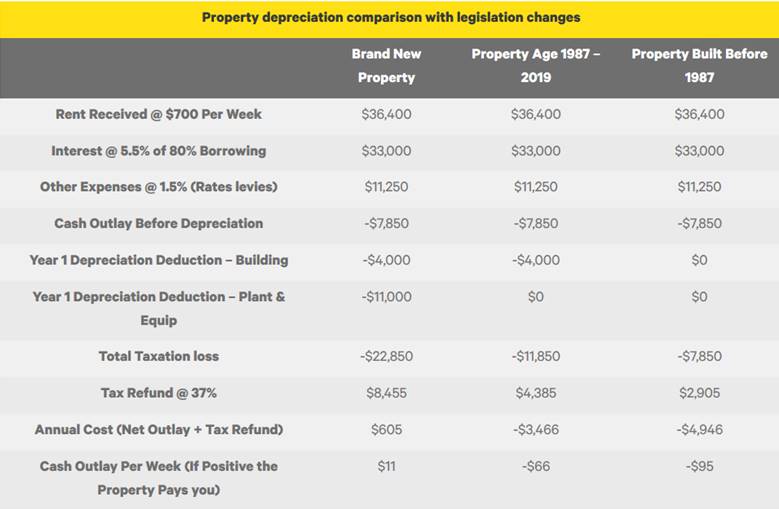I get it.
I get why a large proportion of Australians are against the tax deductions available to ‘negatively geared’ property investors.
And I agree (in some ways) – that the current policy of allowing property investors to deduct their property losses against their wages could be improved (some/most of you would be surprised to hear me say that – considering I own a business where all my clients are property investors and a large proportion of those are negatively geared).
You see, I don’t think negative gearing on property was ever designed to enable someone to own 50 properties, claim all the losses and reduce their taxable income down to zero dollars and pay no tax.
Further, I don’t think negative gearing should enable someone to buy a $20m house in Vaucluse and get rent of $3000 whilst claiming the massive losses on the $20m house as a tax deduction.
That was never part of the plan – but both are achievable under the current tax regime.
So I do get it.
BUT – the proposed Labor policy to limit negative gearing to brand new properties only could be improved in my opinion
Next month – I will outline one solution that could address the problems highlighted above and would also allow the Labor Party to “save face”, should they win the upcoming Federal Election.
First, a quick recap of Labor’s Negative Gearing & CGT policy…
- From a yet to be determined date – negative gearing will only be allowed on brand new properties moving forward.
- Existing negatively geared properties will be grandfathered and not thus not affected.
- Moving forward you will no longer be able to deduct these losses against your personal income , you will be able to deduct them against other investment income (say share dividends or other positively geared property) or you can carry the losses forward to offset the final capital gain.
- Labor will reduce the capital gains tax discount for assets that are held longer than 12 months from the current 50 per cent to 25 per cent.
So that’s what’s currently on the table.
Here are 7 factors that you, I and the Labor Party need to think about when it comes to abolishing negative gearing as we know it and halving the CGT discount:
1. Labor’s policy will open a can of spruiker worms
The current proposal by Labor will abolish negative gearing on future purchases of 2nd hand residential property but will still allow negative gearing for brand new property.
I get the reasoning behind this line of thinking. No one wants to stop new development and construction – because construction has a massive flow-on effect through the broader economy.
However, it also opens a door already ajar for property spruikers to further push overpriced property off the plan to potential investors.
Next thing you know investors are flying off to the Gold Coast and being shown the red carpet!
Of all the material I have read when researching this article – I haven’t seen many written by people who understand how the New Property selling market works – only by economists who look at numbers.
2. Creation of a two-tiered property market
By creating a property market where you allow far greater deductions on brand new property in comparison to a similar 2nd hand property, it makes it very hard to sell almost new property.
Why would you buy a property that is, say, one year old when you can buy the one that is brand new next door and get significantly better tax benefits?
Having one rule for new properties and another for 2nd hand property was already implemented by the Turnbull Govt in May 2017
As you probably know by now – you can only claim depreciation on the plant and equipment in brand new buildings or if it was purchased brand new for a second hand property.
So I crunched the numbers, using the new depreciation laws and the current negative gearing regime.

In the above table, I have compared the purchase of a brand new property, a property built between 1987-2019 and a property built before 1987 if purchased after the May 2017 legislation changes.
If a property is built before 1987, you cannot claim the building allowance or structure of the building (this is why I have chosen this date).
I have assumed that rent, interest and other costs are the same across the board for illustrative purposes.
As you can see – there is already a significant benefit in buying a brand new property in comparison to buying a second hand property.
Labor’s policy will just increase this bias towards new property.
3. Labor’s policy may actually favour the wealthy
I’m going to declare something here – I actually grew up in a strong Labor household. Gough Whitlam even came to my house back in the day, as my father ran for Labor in the seat of Lowe in 1975 against Billy McMahon.
Why do I tell you this? Well, two reasons, a. so readers don’t think I’m a Liberal Party stooge and b. because I’m not sure the following scenario reflects the Labor values from yesteryear
Consider the following two examples assuming the proposed changes are implemented:
Scenario 1. Jill Jones has 8 positively geared properties and a range of shares all owned in her own name.
Jill buys a negatively geared property – Jill can now use the benefit of the tax losses from her negative gearing and claim those losses against her investment income.
Jill can utilise her property tax losses now.
Scenario 2. Jill’s sister – Mary – has no properties or shares. Mary buys a negatively geared, two-year old property.
Mary, because she doesn’t have any other assets, may only be able to use the losses, if she sells the property and it makes a profit.
Mary cannot utilise her property losses now and possibly ever.
4. The cost benefit analysis
In researching this article, I couldn’t find much information relating to the impact on revenue lost by the implementation of abolishing negative gearing on second-hand properties.
Recently, however, PIPA has released a statement that the proposed changes will cost the Labor Party between $10bn to $32bn over a 10-year period.
Now some of you might say that PIPA is a property organisation with an agenda to push – but what if they are even half right?
One thing I certainly agree with from their media release is "I have no doubt that limiting negative gearing and reducing capital gains tax concessions by the Federal Labor Party will discourage property investors from buying property" Mr Koulizos said.
So what impact will less transactions have:
- It will mean less Stamp Duty collection for the states.
- It will mean less sales commission paid to real estate agents and less mortgage commissions, buyers agents fees etc. which could have a knock-on effect throughout the economy.
- It could mean people with existing investment properties that are grandfathered will hold onto them – thus reducing the CGT collection.
- It could mean less Land Tax collection – because lower property prices will in turn reduce the overall land values of property, and the land value is used to determine the amount of land tax payable.
- Oh and the big one – It will mean less work for Quantity Surveyors and I will have to play more golf. Well in that case – knock your socks off Labor and go for it. (I’m allowed one joke if you have read this far – right!?)
5. Negative Gearing as a concept is misunderstood
Most people probably understand that property is negatively geared when the money you pay out to own the property is higher than your rent.
BUT if I asked the average person on the street if they realised that by abolishing negative gearing on newly acquired, second-hand properties – you would no longer necessarily be able to immediately claim property management fees, strata levies and even Land tax – would they think that’s fair?
Interestingly, of the 2,202 people surveyed in our own poll, when asked this, almost 38% said they were not aware of this.
So let’s imagine this scenario – you rent out your newly acquired second-hand property for $500 per week and you pay interest costs of $500 per week, which is fairly reasonable.
Here’s a list of “losses” that you will no longer be able to deduct immediately if Labor’s policy becomes law:
- Body corporate fees
- Maintenance like lawn mowing
- Advertising for a tenant
- Council Rates
- Water charges
- Property Management fees
- Repairs to property
And finally, one that makes me really laugh, you might not even be able to claim LAND TAX as a deduction.
These losses may be carried forward and utilised in the event you sell your property for a profit or you can offset these losses against investment income from other positively geared property or your vast array of shares that you own!
6. It is the wrong time to tinker with Negative Gearing
Labor’s policy on negative gearing was launched at a time when property in Sydney and Melbourne were, quite simply, inflated. As we all know, things have changed.
Labor was looking for an alternate policy to the status quo and something that would help the housing affordability crisis.
A Treasury document released under the Freedom of Information Act acknowledged that "the ALP policies could introduce some downward pressure on property prices in the short term particularly if the commencement of the policy coincides with a weaker housing market".
7. I’m actually ok with the CGT changes
That may shock some of you, but provided the halving of the CGT discount applies to both shares and property I don’t think it will have a big impact on whether property investors buy or not. And of course it will generate significant revenue for the government.
You see, from my experience, most investors (rightly or wrongly) focus on the cashflow requirements of the property investment in the early years to ensure they can afford the property.
And there’s also one great way to avoid paying CGT on property – don’t sell it!
The solution
Well if the polls and betting agencies are correct – it looks like the Labor Party will win the next election.
So we are going to need a solution that will enable the Labor Party to keep its election promise in a way that will not disrupt the property market and will still increase the Government’s revenue.
..............................................
 Tyron Hyde is the CEO of Washington Brown and is considered one of Australia’s leading experts in property tax depreciation. He is also a registered tax agent. Washington Brown manages construction costs worth over $2 billion and completes 10,000 schedules annually. For a depreciation schedule quote CLICK HERE and follow the 3 simple steps or estimate your depreciation cost.
Tyron Hyde is the CEO of Washington Brown and is considered one of Australia’s leading experts in property tax depreciation. He is also a registered tax agent. Washington Brown manages construction costs worth over $2 billion and completes 10,000 schedules annually. For a depreciation schedule quote CLICK HERE and follow the 3 simple steps or estimate your depreciation cost.
The Washington Brown Free Depreciation Calculator will give you an estimate of the depreciation deductions you could claim on your investment property
Read more Expert Advice articles by Tyron
Disclaimer: while due care is taken, the viewpoints expressed by contributors do not necessarily reflect the opinions of Your Investment Property.